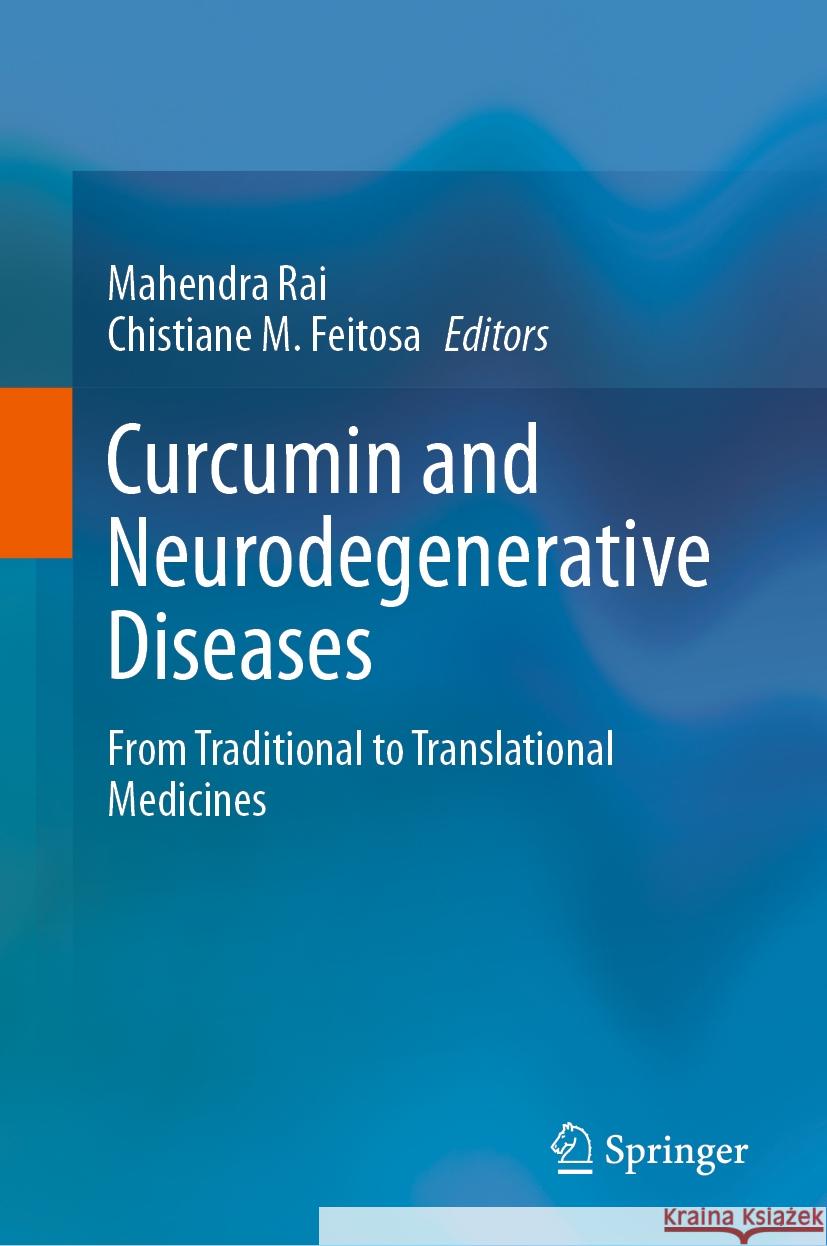Curcumin and Neurodegenerative Diseases: From Traditional to Translational Medicines » książka



Curcumin and Neurodegenerative Diseases: From Traditional to Translational Medicines
ISBN-13: 9789819977307 / Angielski
Curcumin and Neurodegenerative Diseases: From Traditional to Translational Medicines
ISBN-13: 9789819977307 / Angielski
(netto: 659,39 VAT: 5%)
Najniższa cena z 30 dni: 689,15 zł
ok. 20 dni roboczych.
Darmowa dostawa!
Chapter 1_Turmeric in Neurodegenerative diseases: An overview.- Chapter 2_Turmeric: Does it work in neurodegenerative disorders? Separating myth from reality.- Chapter 3_Curcumin bioavailability and constraints of its systemic effects.- Chapter 4_Traditional uses of Turmeric in Neurodegenerative diseases.- Chapter 5_Curcuma from kitchen to cure for neurodegenerative diseases.- Chapter 6_Curcuma used in neurodegenerative diseases: Applications in Ayurveda and Chinese medicines.- Chapter 7_Secondary metabolites of Turmeric (essential oils/extracts).- Chapter 8_Curcuminoids and Sesquiterpenoids from Curcuma longa Rhizomes: Are they better against cancer or neurodegenerative disorders? - Chapter 9_Curcuma in aging (age-related neurodegenerative diseases).- Chapter 10_Pharmacokinetics and pharmacodynamics of curcumin.- Chapter 11_Curcuma, curcumin and its nanoparticles in Parkinson's disease.- Chapter 12_Curcumin as a novel therapy for brain diseases.- Chapter 13_Curcumin induced Neuroprotection in cerebral Ischemia.- Chapter 14_Neural Stem cell therapy in combination with Curcumin.- Chapter 15_The use of curcumin in Parkinson’s disease.- Chapter 16_Effects of curcumin on mitochondrial dysfunction in NDs.- Chapter 17_Clinical trials and evidence-based approaches to evaluate curcumin efficacy in human health and disease.- Chapter 18_Nanocurcumin in neurodegenerative.- Chapter 19_Role of Nanocurcumin in Alzheimer’s disease.- Chapter 20_Modification of curcumin scaffold in the search for new effective therapeutic agents against NDs.- Chapter 21_Curcumin-loaded nanoparticles in neurodegenerative diseases.- Chapter 22_Curcumin nanoformulation in neurodegnerative diseases.- Chapter 23_Patents in Curcuma/ Curcumin related to Neurodegenerative diseases.
Professor Mahender Rai is UGC- Basic Science Research Faculty Fellow and former head of the Department of Biotechnology, Sant Gadge Baba Amravati University, Amravati, Maharashtra, India. Presently, he is a visiting Scientist at the Department of Chemistry, Federal University of Piaui, Teresina, Brazil. Professor Rai has published more than 450 research papers in Indian and foreign peer-reviewed journals, 70 books and more than 102 articles. He is a member of several scientific societies. His area of expertise includes microbial biotechnology and nanobiotechnology. Currently, the main research interest of his group is the green synthesis of metal nanoparticles particularly using fungi and their applications as nano antimicrobials against pathogenic microbes. He has received several prestigious awards, including the Father T.A. Mathias award (1989) from the All-India Association for Christian Higher Education, and the Medini award by the Government of India. In 2015 (October-November) he was a visiting scientist at Nanotechnology Center, VSB Technological University of Ostrava. He was awarded NAWA fellowship by Polish Government from 2021-2023. Recently, he has been Featured in Stanford's list of the top 2% of scientists in Nanoscience and nanotechnology
Professor Chistiane M. Feitosa is a professor of chemistry at Federal University of Piaui, Teresina (UFPI), Brazil. She has rich experience in chemistry, with an emphasis on Chemistry of Natural Products, working mainly on the following topics: bioassays of the enzyme acetylcholinesterase, antioxidants, medicinal plants, and Alzheimer's disease. CNPq Technological Productivity Scholarship (2015-2018). Professor of the master's programs at the UFPI Teresina campus: Pharmaceutical Sciences with emphasis on Production and quality control of medicines and Master and Doctorate in Chemistry in the area of Chemistry of Natural Products. Review of the magazines: Revista Brasileira de Farmacognosia, Pharmaceutical biology, Journal of Medicinal Plants Research and European Journal of Medicinal Plants. She has supervised more than 30 students in the master's and doctoral programs in the chemistry and pharmaceutical sciences programs at UFPI. Professor Feitosa is well known for her research on the application of natural products in neurodegenerative diseases. Her present research is focused on the role of Curcuma and curcumin in neurodegenerative diseases. She has published more than 70 research papers, several book chapters and 10 books from different reputed publications.
This book explores the potential benefits of turmeric, and specifically curcumin, in the treatment and prevention of neurodegenerative diseases. The book covers various aspects of turmeric, including its traditional use in Ayurveda and Chinese medicine, secondary metabolites, curcuminoids, and sesquiterpenoids found in turmeric, as well as the use of nano curcumin in neurodegenerative diseases. It discusses the different ways in which turmeric can be used to treat neurodegenerative diseases, including as a therapy for brain diseases, curcumin-induced neuroprotection in cerebral ischemia, and neural stem cell therapy in combination with curcumin. It also discusses the role of nano curcumin in neurodegenerative diseases, including its potential use in the treatment of Alzheimer's disease. The book provides the scientific evidence behind the use of turmeric and its compounds in the treatment of neurodegenerative diseases, such as Alzheimer's and Parkinson's disease. Overall, this book is an invaluable resource for researchers and healthcare professionals interested in exploring the potential benefits of turmeric and curcumin in the treatment and prevention of neurodegenerative diseases.
1997-2025 DolnySlask.com Agencja Internetowa
KrainaKsiazek.PL - Księgarnia Internetowa









